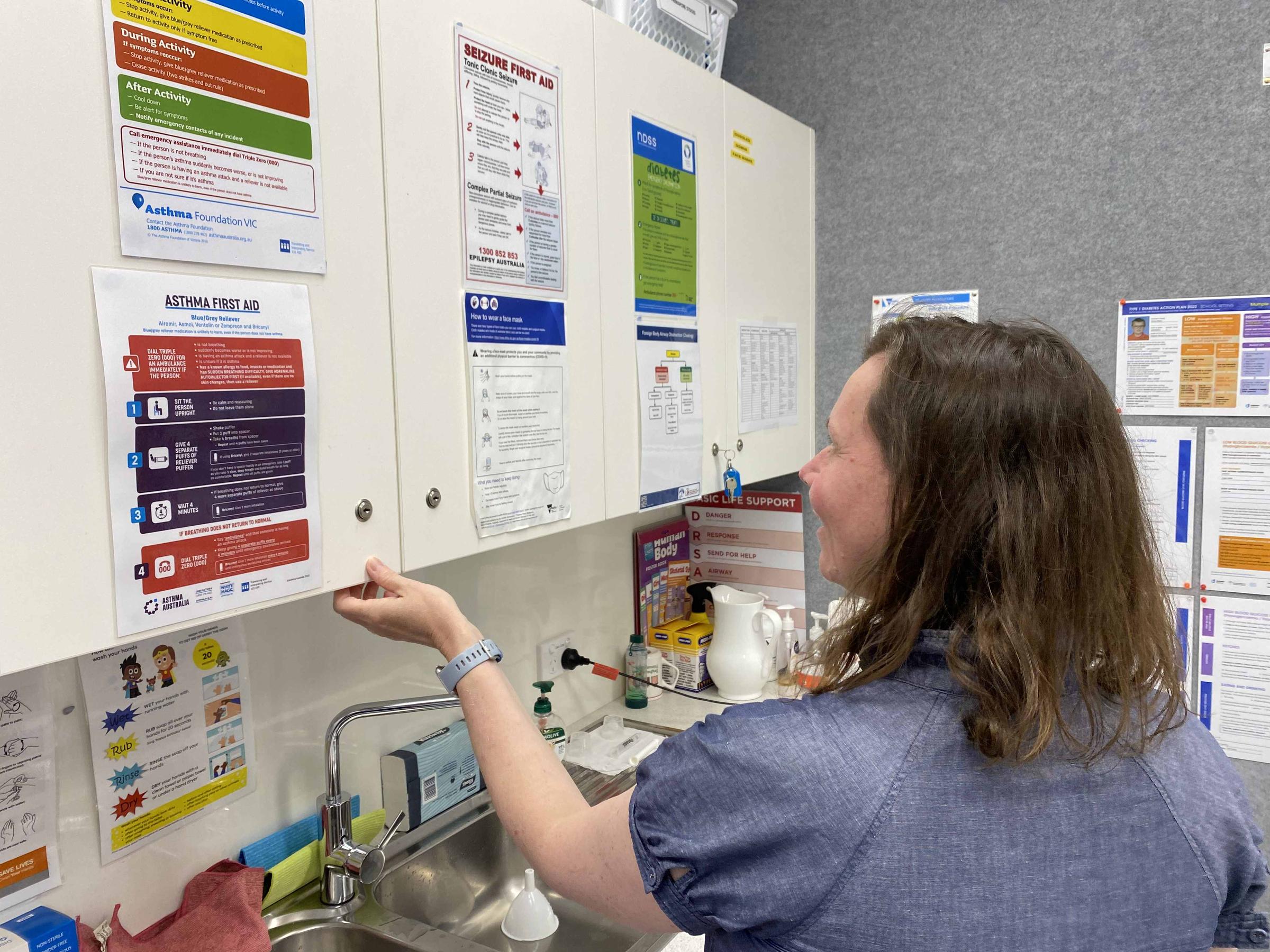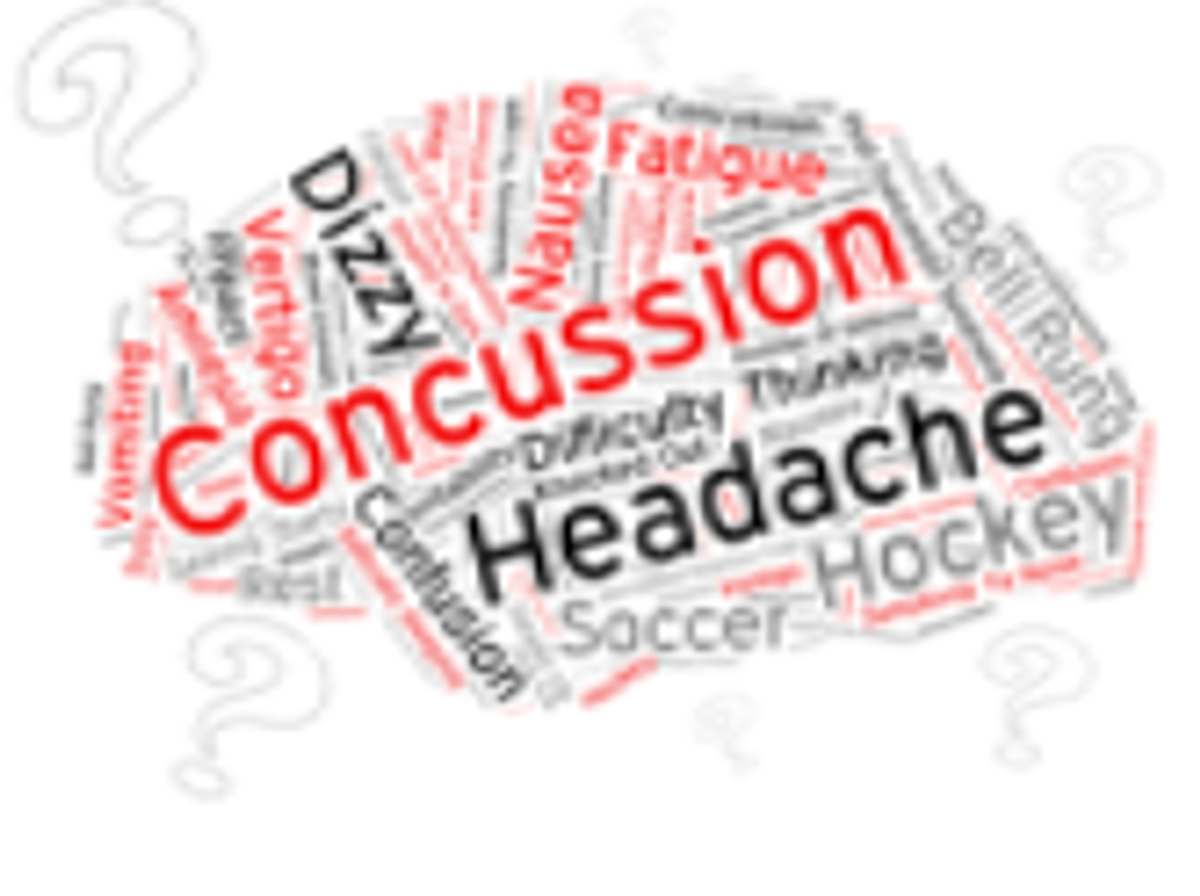First Aid

HEAD KNOCKS & CONCUSSION
Children can have many bangs or bumps to the head, and it can be difficult to tell whether they are serious or not. Any knock to the head is considered a head injury. MOST head injuries are mild and simply result in a bump or a bruise. Moderate to severe head injuries can result in injury to the brain.
The brain is made up of soft tissue and it is cushioned by blood and spinal fluid. When someone gets a blow to the head or hits something very hard, the brain suddenly shifts inside the skull and can knock against the skull's bony surface. Sometimes this can happen with a lot of force. A concussion is a temporary change in the way the brain works when it is suddenly moved or jarred in this way.
The signs and symptoms of a concussion can be subtle and may not be immediately apparent. Some symptoms of concussion may be immediate, and others delayed in onset by hours or days after the injury. Most concussions will improve on their own with rest, over several days but symptoms can last for weeks or even longer.
Signs of a mild head injury or concussion:
- A decreased level of consciousness at the time of injury but the person is now alert and interactive
- May have vomited, but only once.
- Bruises or cuts to the head
- They otherwise appear normal
Emergency care should be sought immediately if there is:
- Loss of consciousness
- Repeated vomiting
- Persistent or worsening headache
- Confusion or disorientation, such as difficulty recognising people, time, or place
- Drowsiness
- Slurred speech
- Changes in physical coordination, weakness in their arms or legs
- Seizures
- Vision or eye disturbances (such as dilated or unequal pupils)
- Bleeding that is difficult to stop, an object stuck in their head or a large bump or bruise
- Bleeding or any discharge from the ear or nose
No one should return to sport or vigorous activity until all symptoms of a concussion have gone. Reaction times can be slower which can put them at risk of further injury. It is important to avoid another head injury before fully recovering from the first.
At Brighton Beach P.S it is our policy that all children who obtain a knock to the head (no matter how hard the perceived contact is) are required to tell the teacher in charge (yard duty teacher or class teacher) and then be sent to the first aid room for observation. Parents of children who report a head knock will always be notified even if the child is showing no signs or symptoms of a concussion or head injury at that time. This is because signs and symptoms can sometimes be delayed in onset.
Further information can be found at The Royal Children’s Hospital Head injury – general advice fact sheet: http://www.rch.org.au/kidsinfo/fact_sheets/Head_injury/
IF YOU ARE EVER CONCERNED ABOUT YOUR CHILD AFTER A BLOW TO THE HEAD SEEK MEDICAL ADVICE.
HAY FEVER
Hay fever is the common name for a condition called allergic rhinitis, which means an allergy that mainly affects the nose. However, hay fever can also affect your eyes, throat, sinuses and ears.
Seasonal hay fever occurs mainly in spring and summer, and affects people allergic to pollens. Hay fever can also occur all year round – this is called perennial hay fever.
Hay fever is very common, and affects up to 30 per cent of children. Children with hay fever commonly also have other sensitivities, like asthma, eczema or food allergy.
Signs and symptoms of hay fever
If your child has hay fever, they may have:
- frequent bouts of sneezing
- a runny nose
- blocked nose (either one or both nostrils)
- itchy ears, nose, throat and roof of the mouth
- red, itchy, swollen and/or watery eyes
- headaches.
If hay fever is left untreated it can lead to poor quality sleep, tiredness and daytime sleepiness. In some cases, hay fever can also:
- make asthma more difficult to control
- increase the chance of sinus infections
- affect your child's learning and performance
- lead to bad breath, a husky voice and/or a sore throat
- cause more frequent eye infections because children rub itchy eyes.
What causes hay fever?
Hay fever is triggered by what we breathe in. The small hairs and mucus in the nose trap dust, pollens and other tiny particles. Someone with hay fever is allergic to some of the particles that get trapped in their nose.
Triggers include:
- pollen (from grasses, flowers and trees)
- dust mites
- animal fur or hair (dander)
- mould spores
If your child has perennial (all year) hay fever, they will most likely be allergic to dust mites and/or animal dander.
Treatment for hay fever
Hay fever cannot be cured, but there are a number of ways you can improve the symptoms and give your child some relief.
The best way to reduce the frequency of your child's hay fever is to identify what causes your child's allergic reaction and then try to avoid contact with it, or at least minimise contact.
Sometimes the cause is obvious, such as a pet. If you are having trouble working out the cause of your child's hay fever, see your GP. The doctor will ask questions and may suggest allergy tests (such as skin prick tests) to identify the cause.
If your child is allergic to pollen, checking the pollen count for your region can help you be aware when your child's hay fever might be worse.
Your doctor may suggest using medication to help relieve your child's symptoms, such as:
- non-drowsy antihistamines
- steroid nasal sprays, which may be useful for older children.
Your doctor or pharmacist can give advice on which medication may be best for your child.
Immunotherapy may be a suitable treatment option if your child has severe hay fever. Immunotherapy is a long-term treatment that involves exposing your child to small amounts of the allergen (the substance they are allergic to). This allows your child to gradually build up their tolerance to the allergen, which will ultimately reduce their symptoms long term. Talk to your doctor about immunotherapy if your child has severe symptoms and other medications are not helping.
Key points to remember
- Hay fever is an allergic reaction that mainly affects the nose.
- It is most common in spring and summer, but can occur all year round.
- Avoiding triggers is the best way to reduce the frequency of hay fever symptoms.
- Medications may help relieve symptoms.
For more information
- Kids Health Info fact sheet: Allergic and anaphylactic reactions
- Kids Health Info fact sheet: Asthma
- Kids Health Info fact sheet: Asthma – videos (for instructions on how best to use a nasal spray)
- Australasian Society of Clinical Immunology and Allergy: Is it allergic rhinitis (hay fever)?
- AusPollen: pollen forecast website
- House Dust Mite strategies.

